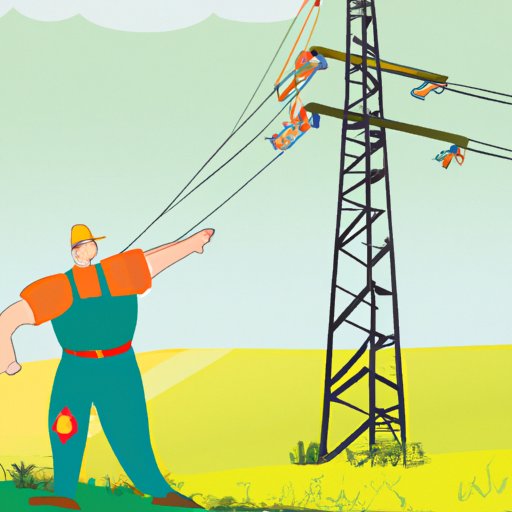Introduction
A lineman is a skilled tradesperson who works on power lines and electrical systems. They install, maintain, repair and replace the infrastructure that provides electricity to homes and businesses. With increasing demand for electricity, linemen are in high demand and can expect a competitive salary.
So how much does a lineman make? Salaries vary depending on several factors, including education, experience, and location. This article will explore these factors and give an overview of what a lineman can expect to earn.
What Factors Affect a Lineman’s Salary?
There are several factors that can affect a lineman’s salary. These include:
Education
Education plays an important role in determining a lineman’s salary. Most employers require applicants to have at least a high school diploma or GED. Some may require additional training, such as a technical certificate or degree in electrical engineering technology. Those with higher levels of education may be eligible for higher salaries.
Experience
Experience is another factor that affects a lineman’s salary. Those with more experience are typically offered higher salaries than those with less experience. The amount of experience required varies by employer, but most require at least two years of experience working on power lines.
Location
Location is also a major factor in determining a lineman’s salary. Salaries can vary significantly from state to state, and even from city to city. For instance, according to the Bureau of Labor Statistics, the average hourly wage for linemen in California is $39.77, while the average hourly wage for linemen in Texas is $26.71.

The Average Salary of an Experienced Lineman
National Averages
According to the Bureau of Labor Statistics, the median annual wage for linemen in the United States was $63,150 in 2019. The lowest 10 percent earned less than $38,310, while the highest 10 percent earned more than $97,170.
Regional Differences
As mentioned above, salaries can vary significantly from state to state. According to PayScale, the average salary for linemen in California is $73,964, while the average salary for linemen in Texas is $50,721. Other states with higher-than-average salaries for linemen include Alaska ($77,858), New York ($72,541), and Massachusetts ($71,874).
How Much Does a Journeyman Lineman Make?
Average Salary
A journeyman lineman is an experienced lineman who has completed an apprenticeship program and has several years of experience working on power lines. According to PayScale, the average salary for a journeyman lineman in the United States is $75,229 per year. This figure is higher than the national average for linemen, which is $63,150.
Benefits
In addition to a competitive salary, linemen also enjoy a range of benefits, including health insurance, vacation time, and retirement plans. These benefits can vary depending on the employer, so it’s important to research the specific benefits offered by any potential employer before accepting a job.
Yearly Income for a Line Worker
Overtime Pay
Linemen often work long hours, and overtime pay is common. According to the Bureau of Labor Statistics, the average overtime pay for linemen is $14.48 per hour. This means that linemen can potentially earn thousands of dollars in overtime pay each year.
Bonuses
Many employers also offer bonuses to linemen. These bonuses can range from a few hundred dollars to several thousand dollars, depending on the employer. Some employers may also offer performance bonuses based on the quality of the lineman’s work.

Location Matters: Comparing Line Worker Salaries Across the US
Highest Paying States
The highest paying states for linemen include Alaska ($77,858), California ($73,964), New York ($72,541), Massachusetts ($71,874), and Washington ($70,491).
Lowest Paying States
The lowest paying states for linemen include Arkansas ($46,097), Missouri ($45,936), West Virginia ($45,337), Louisiana ($44,894), and Mississippi ($43,818).

How to Increase Your Prospects as a Lineman
There are several steps you can take to increase your prospects as a lineman. These include:
Education
Continuing your education can help you stand out from other applicants and increase your chances of getting hired. Pursuing a technical certificate or degree in electrical engineering technology can give you an edge over other candidates.
Certification
Getting certified can also increase your chances of getting hired. Many employers look for applicants with certifications from organizations such as the International Brotherhood of Electrical Workers (IBEW) or the National Joint Apprenticeship and Training Committee (NJATC).
Networking
Networking is also important for finding jobs as a lineman. Building relationships with other linemen and industry professionals can help you find job opportunities and get your foot in the door.
Conclusion
This article has explored the salary of a lineman in the US. Factors such as education, experience, location, overtime pay, and bonuses can all affect a lineman’s salary, and salaries can vary significantly from state to state. Those looking to increase their prospects as a lineman should consider continuing their education, pursuing certification, and networking with industry professionals.
(Note: Is this article not meeting your expectations? Do you have knowledge or insights to share? Unlock new opportunities and expand your reach by joining our authors team. Click Registration to join us and share your expertise with our readers.)
